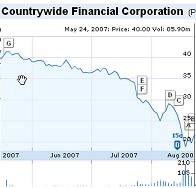Interest Rates and The Moral Hazard: Why You Must Buy GOOG Now
Here’s what’s happening in the stock market: people bought stocks on credit, and now they can’t pay it back because the interest rates are too high, and their collateral caught on fire. And the lenders want their money back, now.
This has everything to do with psychiatry.
The TV news keeps talking about subprime mortages—during the housing boom, people took mortgages, with no money down, at low introductory rates, and now these rates (ARMs) have increased, so their mortgage payments have increased. But the housing market has simultaneously fallen, a lot, so that the price of the house is often worth less than the whole mortgage. In other words, you’d be better off simply walking out the door and defaulting.
But what’s happening in the markets is about more than mortgages, it’s about credit. Partly from losses, but mostly out of fear, lenders are unwilling to offer the easy credit—or credit of any kind.
Typically, hedge funds borrow massively against capital. If a hedge fund has $X, they can borrow from banks 10X. As long as the market is stable, they can make the interest payments on that loan, just like you would for a credit card. But if the market goes down, not only can they not make the interest payments, but worse, the bank calls them up and asks for all its money back—at once. If the bank sees the market tanking, it will call in its loans—a margin call—because it suspects that every moment it waits is a greater chance of default. So the hedge fund has to raise money by selling things, or dipping into the initial capital. But what if the initial capital of $X was actually other people’s mortgages, which hedge funds bought as an investment—and are now nearly worthless? The answer is the old adage: when you can’t sell what you want, sell what you can. So they sell everything, and the market tanks uniformly. That’s why Google, which has nothing to do with mortgages and has no debt of its own, was off 70 points.
I know a lot of people don’t care about hedge funds, the bath houses of the super rich. And therein lies exactly the problem we are addressing today.
The average person’s assessment of all this is this: fuck ‘em. They were making easy money for too long, for nothing (defined here as capital; they simply borrowed the money to make more money). If they go bankrupt because the market takes a dive, too bad.
The problem is that credit isn’t just about hedge funds, or even mortgages. Without this credit, private equity firms, and hedge funds, don’t invest capital in languishing or dying companies. (Remember Dunkin’ Donuts 20 years ago vs. today?) If they don’t invest, the company goes bankrupt, and people lose their jobs. These people who lose their jobs don’t therefore spend their money on other products, so other companies lose profits (which is why, in these cases, food and household products stocks remain stable—you still gotta eat-- while auto, luxury goods, electronics- expensive, less necessary stuff—stocks go to the toilet. That’s a recession.)
So credit is necessary; and the only way to supply easier credit in these circumstances is for the Federal Reserve to lower the interest rates. Lower rates mean easier borrowing means everything can continue. And stocks go back up.
And, of course, hedge funds make billions, again.
So the balance the Fed has to strike is this: can they supply enough liquidity, e.g. make borrowing as cheap as possible—so that businesses can stay afloat, and mortgages can get refinanced and people can stay in their homes—but not send the message to hedge funds that every time something bad happens, the Fed’ll come in and save the day?
This is often called the Fed Put (or, properly, the Greenspan put or Bernanke put, named after the Fed chairmen.) A put is a trading instrument that reduces risk; it’s basically like buying insurance on your investments. If Bernanke routinely lowers rates whenever things get bad, then people will begin to anticipate that he will do it again. The consequence—wait for it, wait for it—is that people take on more risks. They know there’s a limit to their losses. Which is exactly the opposite of what the Fed wants—they’re lowering the rates because people took on too much risk (credit) in the first place, and lost.
This is called the Moral Hazard, and I capitalize it because it is to be revered. It defines humanity. Forget about psychiatry, forget about economics, human beings can be rigorously distinguished by their behavior vis a vis the Moral Hazard, and, even more rigorously than that, how they apply the Moral Hazard it to others.
Nothing, nothing, is more important than this concept. Let’s begin.
Next up: The Moral Hazard
disclosure: long GOOG; though I'm confident Warren Buffett will buy CFC and it goes to 30, I wouldn't buy that death trap now even if it came with two Raiders cheerleaders and a brick of platinum.

8 Comments